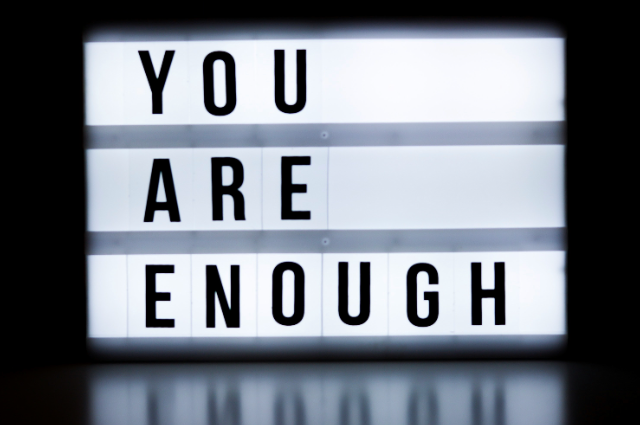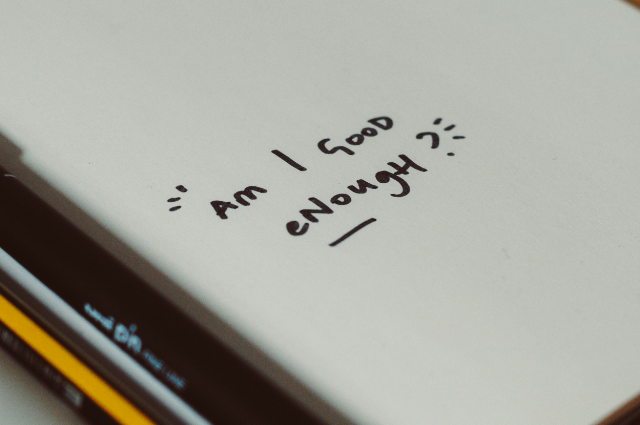There are a few words that cut deep, even when they’re not spoken out loud. They live quietly in the back of the mind, ready to show up at the worst times. For me, those words are: “Just not good enough.”
I don’t know when they first started showing up in my life. Maybe it was in school when a teacher compared my work to someone else’s. Maybe it was during childhood games where I wasn’t picked first or even second. Maybe it was later, as an adult, staring at people who seemed to have their lives perfectly figured out while I was stumbling through mine. The truth is, “not good enough” doesn’t come from one place. It’s everywhere.
And if you’ve ever felt it, you know what I mean. It sneaks in when you fail an exam. It whispers in your head when someone rejects you. It shouts at you when you scroll through social media, seeing people who seem more successful, prettier, smarter, richer, or happier than you.
But here’s the thing I’ve slowly realised: feeling “not good enough” is one of the most human things in the world. Everyone, no matter how confident they seem, carries that thought at some point. Even the people we admire most.
The poet Walt Whitman once wrote:
“Do I contradict myself?
Very well then I contradict myself,
(I am large, I contain multitudes).”
Those words comfort me. They remind me that being human means holding both confidence and doubt inside us. You can feel proud one day and worthless the next, and both are still part of who you are.
Where Does “Not Good Enough” Come From?
It’s easy to blame ourselves for these feelings, but the truth is, a lot of it comes from outside. Think about how often society tells us what’s “good.”
- A good student scores high grades.
- A good worker gets promotions.
- A good woman is expected to look or behave a certain way and follow rules made by society.
- A good man is expected to earn a certain amount.
- A good life is filled with money, houses, cars, and followers online.
- A good LGBTQIA+ person is expected to “fit in,” hide parts of themselves, or prove their worth in ways others are never asked to.
When you measure yourself against these invisible standards, it’s almost impossible to win. Someone will always be better. Someone will always have more. So the voice in your head goes: “You’re not enough.”
The writer Theodore Roosevelt once said,
“Comparison is the thief of joy.”
I think about that line a lot. Because that’s what happens. We compare, we lose joy, and we stop seeing our own worth.
Personal Story of “Not Enough”
I remember a time in high school when I worked hard on an essay for a competition. I poured my heart into it, spending hours writing, editing, and rereading every line. I thought it was one of the best things I had ever written. I imagined hearing my name announced, maybe even getting a small prize or at least some recognition.
But when the results came out, my essay wasn’t even shortlisted. Other names were read out, other essays were celebrated, and mine didn’t make the cut.
My teacher smiled kindly and said, “Maybe next time,” but that didn’t soften the sting.
That night, lying in bed, all I could think was: “Why do I even try? I’ll never be good enough.”
Looking back now, I realise something. My essay wasn’t less valuable just because it wasn’t chosen. The hours I spent writing, the emotions I put into it, the courage it took to submit it, those were all meaningful. They were good enough.
In fact, they were more than enough. But I couldn’t see it then because I thought being selected was the only proof of worth. Maybe you’ve felt something similar. You gave your best to something, a relationship, a job, an exam, or even a creative piece, and it still didn’t turn out the way you hoped.
So you told yourself you weren’t good enough...
But what if “good enough” is not about being picked, winning, or being perfect? What if it’s simply about showing up, trying, and giving what you can?
The Hidden Side of Great People
Sometimes, I wonder: did people we admire ever feel this way?
The answer is yes.
Take Vincent van Gogh. Today, his paintings are priceless, hanging in museums across the world. But during his lifetime, he sold almost none of them. He struggled with self-doubt and mental illness, and in his letters, he often wrote about feeling worthless. Imagine that a man whose art is now celebrated everywhere once thought he was “not good enough.”
In one of his letters, he wrote,
“What would life be if we had no courage to attempt anything?”
Even when he felt like he was never enough, he still painted... He kept going...
Then there's Frida Kahlo, whose story deserves more light. She was a Mexican painter, known for her deeply emotional and symbolic self-portraits. But behind her bold colours and strong gaze, there was deep pain. As a child, she had polio. Later, she suffered a horrible accident that left her in constant pain. And in between all that, she also carried the heavy burden of trauma, including sexual abuse and betrayal. Instead of hiding her pain, she poured it into her paintings. Her art spoke of her struggles, her identity, her body, and her truth.
She once said,
“I never paint dreams or nightmares. I paint my own reality.”
Frida didn’t pretend to be okay. She turned her scars into stories. And that’s more powerful than pretending to be perfect.
Or think about Abraham Lincoln. He lost multiple elections before finally becoming president. He faced failure after failure, yet he didn’t let it define his worth.
Instead, he once said:
“I am a slow walker, but I never walk back.”
He wasn’t always confident. He wasn’t always winning. But he kept showing up.
We can also look at Ellen Johnson Sirleaf, the first elected female president in Africa, from Liberia. She grew up in a country where women had very little political power. She faced domestic abuse from her first husband. She was jailed and exiled because of her beliefs. People laughed at the idea of a woman leading a nation. But she didn’t let that stop her. She stood tall and helped rebuild her country after a brutal civil war.
She said,
“If your dreams do not scare you, they are not big enough.”
Her story shows that even leaders who look strong on the outside may have carried a lot of pain on the inside.
And let's not forget the stories of famous queer icons who had to fight not only for their dreams, but for the right to be themselves.
Take James Baldwin, the African American writer and activist who often felt pushed to the margins. As a Black gay man in the mid-20th century, he faced racism and homophobia at every turn. Yet, he transformed his struggles into powerful works like "Go Tell It on the Mountain" and essays that still shape conversations about race and sexuality today.
He once said,
“You have to go the way your blood beats. If you don’t live the only life you have, you won’t live some other life, you won’t live any life at all.”
His work still gives voice to millions who feel unseen.
Another name that stands out is Marsha P. Johnson, a Black transgender woman who was one of the key figures in the early LGBTQ+ rights movement in the United States. She faced poverty, police violence, and rejection. Yet she helped start the Stonewall uprising in 1969, which became a turning point for queer rights.
Marsha often said,
“No pride for some of us without liberation for all of us.”
She fought not because she had no fear, but because she knew what it was like to feel “not enough” in the eyes of the world.
Moral: When we look closely, we see that so many great people were not great because life was easy. They were great because they kept going even when life told them they weren’t enough.
The Trap of Perfection
A big reason many of us feel “not good enough” is that we chase perfection. We want to get everything right: the perfect body, the perfect career, the perfect partner, the perfect life. But perfection is a moving target. Every time you get closer, the bar shifts higher.
The writer Anne Lamott once said:
“Perfectionism is the voice of the oppressor.”
I agree with this. Perfectionism keeps us stuck, paralysed, and convinced that no matter how much we do, it isn’t enough. Think about kids drawing with crayons. They don’t care if the lines are straight or the colours match. They draw because it’s fun. At some point, though, we stop being that kid and start judging ourselves harshly.
What if we could go back, even a little, to that childlike freedom of saying: “This is me. It may not be perfect, but it’s mine”?
Rewriting “Not Good Enough”
So how do we live with this feeling without letting it control us? I don’t think the goal is to erase it. It may always be there in some form. But we can change how we respond to it.

Here are a few things that help me:
- Remember your small wins. Write them down if you can. On bad days, remind yourself of the things you’ve done well, no matter how small.
- Talk to people you trust. Sometimes we’re our own harshest critics. Hearing someone else’s perspective can show us we’re not seeing the full picture.
- Set your own standards. Instead of living by society’s checklist, ask yourself: What matters to me? What makes me proud, regardless of what others think?
- Allow mistakes. Failure doesn’t mean you’re not enough; it just means you’re learning.
- Practice kindness toward yourself. If you wouldn’t call your best friend a failure for making a mistake, why say that to yourself?
Final Thoughts
“Just not good enough.” Those words sting. They linger. They can feel like a weight pressing you down. But here’s the truth: you are already enough simply because you exist. Your worth is not measured by grades, money, beauty, or likes. It’s measured by the fact that you breathe, feel, love, try, and keep going.
The poet Rumi once wrote:
“You are not a drop in the ocean.
You are the entire ocean in a drop.”
That line always brings me peace. Because it’s a reminder that every single person carries value, depth, and meaning, even when they don’t feel like it.
So the next time that little voice tells you, “You’re just not good enough,” try to answer back. Tell it: “Maybe not by your standards. But by mine, I am.”
And maybe, just maybe, that will be enough.

